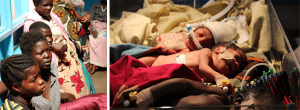Our latest 100&Change blogpost, written by Dr. Queen Dube, talks engaging our stakeholder community in #NEST360, from Ministries of Health to leaders of large global health organizations to the true beneficiaries of our work — the moms, dads, and small babies in Malawi!
We are really enjoying our journey through the MacArthur Foundation’s 100&Change competition, especially hearing the compelling voices of the clinicians working in resource-poor areas, like Queen’s.
Every day I go to work and am faced with tiny babies in need of life-saving care. As a physician, I know how to best care for these small and sick newborns, but I have to watch them struggle unnecessarily. It is heartbreaking. We know what causes our babies to die. We know what interventions can save their lives – the technology.
Last month, I attended Malawi’s Paediatric and Child Health Association meeting in Salima, Malawi. Representatives from UNICEF, Save the Children, USAID, the Association of Malawian Midwives, the Ministry of Health, and others gathered into the same small presentation room.
As a group, we mapped our diverse efforts and commiserated over common challenges – staff shortages, poor medical care during labor and delivery and the frequent power outages affecting the country. When our team shared our 100&Change proposal with these partners, they all agreed that a crucial missing link is the availability of rugged, affordable, effective and easy-to-maintain technologies for our newborns. Without this piece, clinicians like myself have to watch babies die needlessly, and comfort mothers and fathers in the moments after losing their child.
This project makes me think of the day that antiretroviral drugs (ARTs) were introduced for free in Malawi. Before that day, many young adults and children just died of AIDS. The availability of ARTs gave hope when no one expected it, and people began to believe that the problem could be solved.
Our 100&Change project is tackling, for the first time, the critical and neglected problem of newborn mortality with a solution that can work. The time to end preventable newborn death is now. Our proposal gives me hope.

